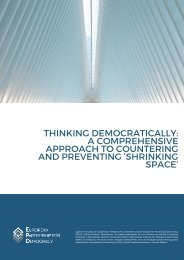Repression and resilience: Diagnosing closing space mid-pandemic
You also want an ePaper? Increase the reach of your titles
YUMPU automatically turns print PDFs into web optimized ePapers that Google loves.
REPRESSION AND RESILIENCE: DIAGNOSING CLOSING SPACE MID-PANDEMIC<br />
33<br />
Recommendations<br />
While it is popular for governments to speak of their plans to ‘build back better’, current events don’t necessarily point<br />
in that direction. 121 Over a year into the p<strong>and</strong>emic, there are few signs of the kind of radical reform that ‘building back<br />
better’ for democratic <strong>space</strong> requires. It is likely that most countries will reinforce a problematic status quo, or even<br />
further erode the foundations of democratic <strong>space</strong>. This means that those defending democratic <strong>space</strong> - civil society,<br />
media, independent judiciaries, <strong>and</strong> political opposition - will face more resistance <strong>and</strong> repression than before, while<br />
trying to stay afloat a<strong>mid</strong> a global economic crisis.<br />
Building back better will also mean different things in different countries. Not all countries were equally affected by<br />
the COVID-19 p<strong>and</strong>emic, <strong>and</strong> in many countries pre-existing political constellations <strong>and</strong> dynamics in democratic <strong>space</strong><br />
defined the impact of the p<strong>and</strong>emic measures on democratic <strong>space</strong>. In some countries, the question will not even be<br />
about building back better, but fighting the government’s refusal to build back <strong>and</strong> open up. With such tough times<br />
ahead, international support will be of the essence to support the continued activism <strong>and</strong> security of these changemakers.<br />
It is not too late to truly build back better <strong>and</strong> emerge from the p<strong>and</strong>emic with more <strong>space</strong> for democratic contestation<br />
<strong>and</strong> cooperation. EU Member States, the EU institutions <strong>and</strong> Delegations can play a pivotal role in this process, by<br />
supporting local actors <strong>and</strong> using their own political <strong>and</strong> financial tools to defend <strong>and</strong> exp<strong>and</strong> democratic <strong>space</strong><br />
in the p<strong>and</strong>emic’s aftermath. With a country- <strong>and</strong> context-specific approach, donors should build on their previous<br />
cooperation plans <strong>and</strong> strategies <strong>and</strong> adapt them to meet the challenges that were heightened by the p<strong>and</strong>emic. This<br />
will only be credible if they also build back better at home.<br />
If the international community was stuck in its efforts to counter <strong>closing</strong> <strong>space</strong> before the p<strong>and</strong>emic, 122 policy-makers<br />
<strong>and</strong> donors are facing even more dire circumstances today. The benefits of the additional funding made available<br />
for the p<strong>and</strong>emic recovery will only be reaped if a holistic approach is taken that places democratic <strong>space</strong> front <strong>and</strong><br />
center of the p<strong>and</strong>emic response. To this end, we make 8 main recommendations to defend democratic <strong>space</strong> in the<br />
p<strong>and</strong>emic recovery response.

















